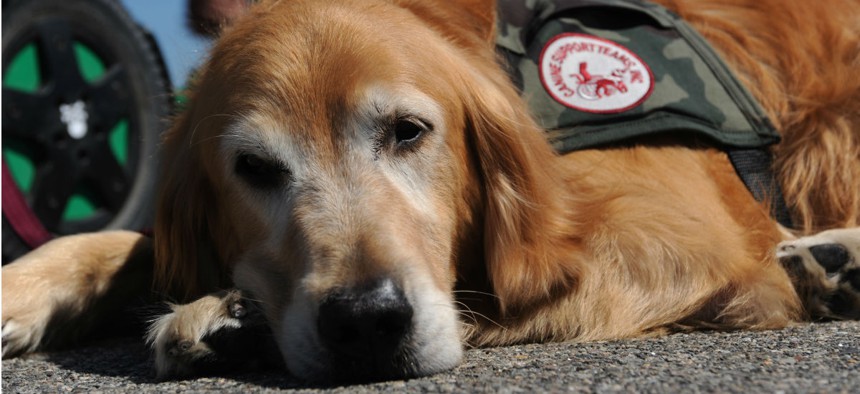
Scott Snell / Veterans Affairs file photo
Government Would Pair Service Dogs and Vets With Severe Post-Traumatic Stress Under Bill
Bipartisan legislation would match eligible post-9/11 vets with canines at VA's expense in $10 million pilot program.
Veterans with severe post-traumatic stress would be paired with service dogs paid for by the government to help support them under a new House bill.
The Puppies Assisting Wounded Servicemembers (PAWS) Act, introduced by Rep. Ron DeSantis, R-Fla., would create a five-year, $10 million pilot program that provides the animals for post-9/11 vets with level three or four on the clinician’s PTSD scale. The Veterans Affairs Department would pay for veterinary health insurance for each dog in the program. For eligible vets, the dogs would be in addition to other PTSD treatment they’re receiving from the VA.
“Thousands of our post-9/11 veterans carry the invisible burden of post-traumatic stress, and there is an overwhelming need to expand the available treatment options,” DeSantis said in a statement. “The VA should use every tool at their disposal to support and treat our veterans, including the specialized care offered by service dogs.”
Service animals, particularly dogs, have been shown to have a calming effect on people with anxiety and social disorders, physical pain, and other challenges.
Eligible vets must “have been treated and have completed an established evidence-based treatment and remain significantly symptomatic,” the legislation said. The canines would be trained at the government’s expense, and come from an organization accredited by Assistance Dog International or a private provider. The VA would spend no more than $27,000 per dog, according to the bill.
The legislation (H.R. 4764) also directs the Government Accountability Office to do a report on the pilot program’s effectiveness after it ends in 2022. PAWS had 16 co-sponsors as of March 17 – 13 Republicans and three Democrats.







